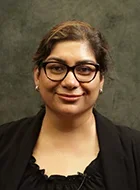A livestream just feels different than a prerecording. Part of it is how you can influence and affect the event by asking questions. Part of it is the organic and unpredictable nature of what unfolds. But when Professor Ria Roy made the decision to schedule live guest lectures instead of recorded ones, she could not have foreseen how engaging and popular they would become with her students.

Access to world-class experts increased engagement and immediacy
Giving students an opportunity to talk directly with high performers in their field builds course relevance, trust and credibility. One student wrote, “The guest lectures were an incredible opportunity to see into real-life practice.”
Roy explains how meaningful and engaging the conversations turned out to be. “The collective experience and knowledge within the class shapes the quality of interaction with the expert lecturer. I have witnessed this repeatedly through our guest lecture series. We have had guest speakers stay for over two and a half hours instead of the requested 90 minutes because of how elevated the conversations became. Our experts have dived even deeper into their topics or digressed into topics of tangential relevance. I have even had students stay back well over two and a half hours to continue discussing the topic — even after the official departure of the speaker!”
Anytime, anywhere is a key consideration for online courses, but an underappreciated one is immediacy — the sense of closeness or reduced distance between people. The expert lectures allow students to hear from and interact with thought leaders and people the students would like to model their careers after. Many students are either industry professionals looking to advance their careers or people looking to break into the performance consulting world.
Another reason Roy arranges guest lecturers? She explains, “The course is complex and it behooves me to showcase this complexity by bringing in speakers so that one does not develop a myopic or a singular-lensed understanding about organizational performance.” Indeed, she often refers to the guest speakers as “expert lecturers.”
What the expert lectures involve
Although the primary intended audience is Roy’s own students, she sends invitations out to everyone in the Organizational Performance and Workplace Learning (OPWL) department.
The three-to-four guest lectures typically happen on a weekday evening via Zoom, and while students are encouraged to attend, the recordings are made available in Canvas for those who can’t (though almost everyone does). Roy tries to schedule the guest lectures during a time in the semester when students have already studied the issues the speaker will talk about, though sometimes the lectures serve as more of an introduction to the topic. She has also gone beyond a single guest speaker on occasion and arranged panel discussions.
Students are very participatory and interactive, asking lots of questions. Roy likes to ask basic “novice” questions near the beginning so students know they don’t have to be scared to ask some basic questions themselves. Sometimes the expert lecturers want questions held to the end, but often they invite questions and comments at any time.
It is not unusual to see the expert lecturers stay past the scheduled time, happy to take questions and explore ideas from an enthusiastic student audience.
Roy gives a reflection activity after the talk via Canvas discussion board, asking students to consider the following:
- What are your critical learnings from this lecture?
- What will you apply within your own organization, department or team? What perceived gap will this critical learning address?
- What barriers do you foresee to its application?
Challenges and support
Although the end result is worth it, setup and scheduling can be time-consuming, Roy says. Compounding this is the fact that Roy doesn’t usually have repeat speakers because the talks are open to everyone in her department, not just the students in her current class. Getting a calendar invitation set can take a lot of back and forth.
Roy also likes to ensure ahead of time that the speakers are comfortable with students asking the thought process behind things, maybe disagreeing with parts of what they are saying. This makes for a more engaged audience during the talk. She also clearly explains to the speakers the scope of the class and how she hopes the talk could fit into it.
Wanting to keep production value high, Roy has also gotten technical support setting up lighting, making sure the recordings are stored in Canvas and ensuring that the sound is top quality. Because she takes such an active role in the talk near the beginning, she gets a volunteer to monitor the chat.
Conclusion
Roy doesn’t hide the time and effort involved. “It once took me four weeks to get someone’s working email address,” she said, shaking her head. “Still, the engagement and student response is worth it, and I’d encourage anyone interested to try it in their own courses.”
Resources
For help designing and teaching an online course, contact eCampus Center and request a consultation. If you’d like to discuss her experiences with live expert lectures, please contact Professor Roy at riaroy@boisestate.edu.
Article Credit
Thanks to Professor Ria Roy and Greg Snow, the eCampus instructional design consultant who worked with Roy on her course in the Organizational Performance and Workplace Learning (OPWL) program.